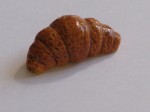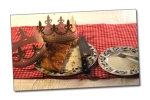Beginning in January, King Cakes sneak across the Sabine River into Texas bakeries and plop onto kitchen tables via our neighbor, the great State of Louisiana. Their delicacy varies…some moist as dewdrops others dry as sawdust. The mysterious location of that small charm lurking within the recesses of sugar, flour and butter tempts even the most diet conscious to plunge in for a chance of discovery. King Cake sightings are made until Mardi Gras; then, suddenly disappear from shelf and fork. I afford them a glancing notice, preferring to concentrate my calories in the pie or cobbler category. However, living in Paris challenged my indifference to the significance of the La Galette des Rois.
La Galette des Rois (cake of the kings) celebrates the Epiphany, the arrival of the three kings (the Magi) to honor Christ’s birth. In the 12th Century, Pope Julius II set the date as January 6th; but, in Paris, the celebration begins the first Sunday after the first Saturday of each January.
The ingredients, shape and texture of these French pastries differ by region. In Paris, the cake is made of puff pastry, beaucoup butter and filled with frangipane (almond cream paste).
In the Provence region, the cake is shaped like a donut and crowned with candied fruit representing the king’s crown. The French colonists brought this tradition to the New World where it evolved into a product more cake-like than pie.
Baked inside each cake is a lucky charm called une fève or bean. The cake represents fertile ground; the bean, a seed that  produces a fruitful harvest and a year of good fortune. Until the end of the 19th century, the charm was made of porcelain; now most beans are plastic. Rare antique porcelain charms tout steep price tags for the collectors’ stash.
produces a fruitful harvest and a year of good fortune. Until the end of the 19th century, the charm was made of porcelain; now most beans are plastic. Rare antique porcelain charms tout steep price tags for the collectors’ stash.
The shape might be a religious figure (Baby Jesus) or the ever-popular horseshoe or the symbol of the bakery (a croissant). Tucked between your Galette des Rois and the bakery box is a gold paper crown to anoint the king (or queen) who discovers the fève hiding in his or her comfit slice. The new monarch drops the charm in another’s wine glass spreading regal wealth among the guests. Laughter, photos and delicious consumption follow.
Moi feite La Galette des Rois
(My celebration of the Kings’ Cake)
I am a miserable cook. The French are marvelous cooks. My insanity quotient was hitting stratosphere level when I invited my French, Italian and German friends to dine at my Paris flat on rue Montorguiel to celebrate the New Year. As Mom always advised, “stick with what you know, kid,” Texas chili and beer comprised the menu. What could Bernadette, Bernard, Tony and Lena know about Texas chili? I felt so…empowered!
Fresh is the maxim for all French food especially fruits and vegetables. Days prior to the appointed event, I browsed the local shops for superior meat, firm tomatoes and crisp herbs. On the day, my minuscule kitchen was a-buzz with dicing, soaking and browning. Chili is always better if the ingredients have a chance to get intimately acquainted. That evening, my guests gobbled bowls of Chili, chips filled with guacamole and Pico de Gallo, plates of salad and, of course, copious glasses of wine and beer. But, the most fun was the conversation and the Galette des Rois.
Bernard and Bernadette brought a large galette from one of the best patisseries in Paris, La Maison du Paul. We warmed the cake ever so slightly and everyone assumed an air of anticipation in finding the bean. Shortly into our revelry, Bernard held up the fève, a porcelain croissant. We crowned him King. He dropped the charm into my wine glass to share his evening of delight. We laughed, snapped photos and finished the evening solving the world’s problems.
A final sweet treat warning…La Galettes des Rois are a delight to the palette, but not to the hips.
Just in case your culinary ambitions and aptitude are beating out of control, here is a recipe to create your Galette des Rois:
Ingredients:
2 round sheets of Puff Pastry
3 eggs
7 oz. almond paste
½ cup of sugar (4 oz)
3-1/2 Tbls. of butter
Preparation:
Leave the puff pastry at room temperature for 2 hours
Preheat oven to 400 degrees F
Line a baking sheet with baking parchment and roll each sheet of
pastry into a 12 inch circle
Mix the eggs, sugar and almond paste until smooth
Spread the mixture evenly on one circle of pasty
Place a “charm” into the almond mixture
Place a sheet of pastry on top and press the two circles together
Brush a beaten egg mixture on top of the pastry. This gives the
cakes a glow
Bake for 20-25 minutes until golden brown.
Always serve warm.





Your entries are always a treat. I definitely think you should bake a King Cake to celebrate the Epiphany …..and Gas Card Wednesday.
Do you know the expression “wash out your mouth!” If I tried to bake the cake you would WANT to wash out your mouth!!! Yea gas card Wednesday. Happy New Year, my dear.
Ymm! Just the whole ritual, symbolism, and tradition of it all.
The writing style is very similar to some of the op-ed and human interest stories that I have written for the paper.
Keep travelling.
Now I know what’s been missing in my life. And it’s so simple – a galette des rois! It’ll have to be a quiet day with no one in the house bffore I attempt to make one….
most wine glasses have very thin structure and i bet that they break easily not unless they are made of quartz glass .;.